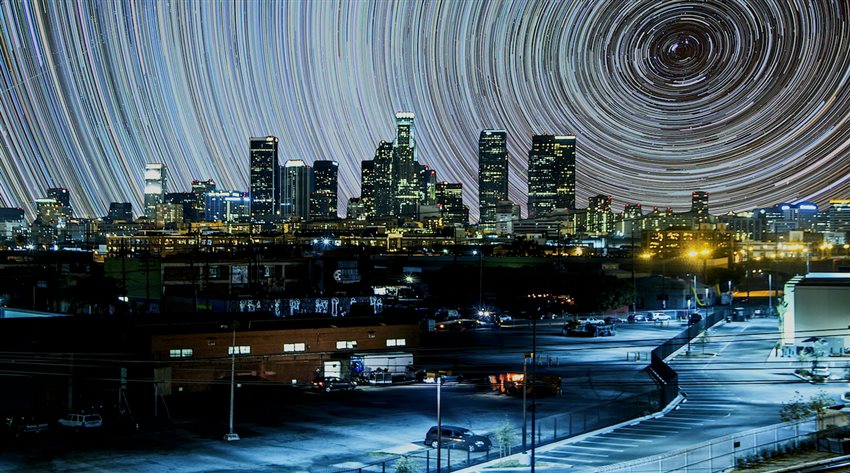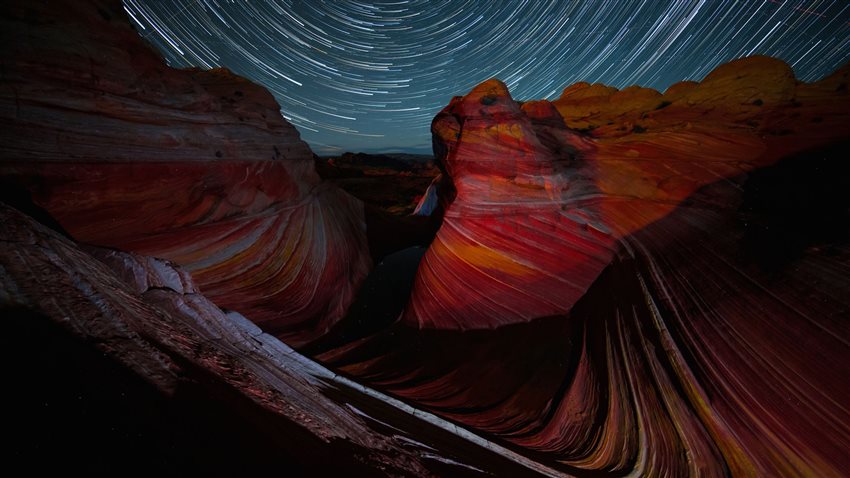Los Angeles filmmakers Harun Mehmedinovic and Gavin Heffernan's new project, Skyglow, explores humanity's severed link with the night sky. Courtesy of Harun Mehmedinovic/www.skyglowproject.com
Most of the 7 billion people on planet Earth have never seen the Milky Way. And within a decade, studies suggest that the spread of artificial light will wipe out the night sky’s most distinct feature in all but a few remote places within the United States.
Until relatively recently, human history was recorded in the stars. And people of all cultures gathered around campfires at night to hear tales of their heroes and gods.
But those stories have faded like the constellations that cradled them, as light pollution’s global reach expands by 6 percent every year. Strangely, few people see this as a problem. Even among professional and amateur astronomers vocal opposition to light pollution is rare.
Those who do push for dark-sky regulations face a common refrain: If you dim the lights, crime and traffic collisions will increase. Streetlights make people feel safe at an instinctual level, even though decades of studies have shown there’s no factual basis for that perception.
The latest findings from the University College London (UCL) were released yesterday in the Journal of Epidemiology and Community Health. Researchers looked at 14 years of data from 63 local authorities across England and Wales, searching for trends among agencies that reduced their lighting.
The authors didn’t study why those municipalities turned off the lights, but they say most simply wanted to save money.
Britain turns off the lights
Economic hard times have hit many of England’s cities and towns, as the country’s councils — local governing bodies — are facing cuts in how much cash they receive from the national government. Out of the country’s 150 councils that have authority over their streetlights, about 100 have either dimmed or turned some off in order to save money. One survey estimated that 750,000 streetlights — roughly one-third of all British streetlights — have gone dark.
This move to darker skies has also sparked a national debate in the country. The Automobile Association claims six people have died as a direct result of dimming the lights.
But that finding was not backed up by the UCL study released yesterday. That research shows less than 1 percent of all nighttime traffic collisions occurred on streets where the lights had been switched off. And overall, the statistics showed no link between accidents and dimming, reducing, or changing the style of streetlights.
Secondly, the researchers looked at lighting’s effect on crime trends. In regions of reduced lighting, they found, there was no increase in burglary, auto theft, robbery, violence, or sexual assault.
“This is very encouraging but it is important to note that it does not mean that this will be the case under all conditions, and so changes to lighting should be managed carefully," study co-author Shane Johnson of UCL Security and Crime Science said in a statement announcing the research.
A companion study conducted by scientists at the London School of Hygiene and Tropical Medicine surveyed 520 people from eight local authorities with varying street light strategies. The researchers found that many residents hadn’t even noticed the lights were turned off, let alone spotted a corresponding uptick in crime.
But while many didn’t realize their neighborhood was darker, others reported “strong concerns” about losing the light. According to the survey, some city-dwellers even saw it as a sign of neglect by local officials.

Star trails light up night sky in an imaginary Los Angeles with dark-sky regulations. Harun Mehmedinovic/www.skyglowproject.com
Things that go bump in the night
Dozens of studies have similarly found that reduced lighting isn’t the negative it’s thought to be. In 1991 researchers from the University of Southampton looked at 100,000 crimes under some 3,500 streetlights. The team found that brighter streets had no noticeable impact on crime, but they did make people feel better.
“On the other hand,” the report summary reads, “they did find that the improved street lighting was warmly welcomed by the public, and that it provided a measure of reassurance...”
The public isn’t alone in ignoring the science either. Police also see bright lights as a crime deterrent.
Last year, Smith College astronomy professor James Lowenthal tried to get the city council in Northampton, Massachusetts, to start shielding new LED streetlights and implement a curfew on businesses that lit up empty parking lots late at night.
The city’s police chief of 20 years, Russell Sienkiewicz, showed up to fight the measure, repeating a line often used by law enforcement: The only thing better for preventing crime than more cops is more lights.
“I would ask just for you to consider if good lighting is important,” Sienkiewicz said, according to the Daily Hampshire Gazette. “If you’re a nurse or a clerk working late and you have to walk in a dark parking lot because you are half-hour behind when a business is closed, would lighting be good for you? Would you feel comfortable?”
In a story in June’s Astronomy magazine, Lowenthal said that even the police headquarters has unshielded streetlights, installed in violation of the city’s existing dark-skies ordinance.
And, in fact, if you’re worried about being victimized, your concerns are often better placed in broad daylight. That’s when — in certain cities at least — crime statistics show you’re most likely to be assaulted (though you are often more likely to get shot at night). Most home break-ins also happen during the day. And the hours just before dawn — the darkest — are also often those with the least crime.
Trulia, the online real estate company, released a series of infographics last year that organized crime stats from across the country by time of day. Their website lets you play with this data in your own neighborhood to see for yourself.

With no nearby cities, Utah's Vermillion Cliffs have some of America's darkest skies. Harun Mehmedinovic/www.skyglowproject.com
The white-light night
And there’s one final, tragic irony about this obsession with lighting the night. Biologists have built a troubling body of evidence that it’s actually killing us, as well as many of the other animals fine-tuned for a 24-hour day-night cycle.
Breast cancer studies show artificial light disrupts the circadian clock and accelerates tumor growth. Scientists are only just beginning to understand many other health impacts, but the American Medical Association has already recommended that cities reduce light pollution and that individuals limit shift work and avoid screentime after dark.
The problem is worse for our fellow organisms. About two-thirds of invertebrates and one-third of vertebrates are nocturnal, and our artificial lights are wreaking havoc on them. From sea turtles and snakes to bats and birds, artificial lights disrupt many animals’ nighttime navigation. Countless insects — including crucial nighttime pollinators like moths — are also drawn in.
Some scientists think the combined result could put entire ecosystems at risk. A recent study in New Zealand showed that certain insects were 48 percent more attracted to the new, more efficient LED lamps many cities are installing than they were to the old school high-pressure sodium vapor streetlights. The researchers said widespread use of the new technology could lead to a “white-light night” that worsens the ecological impact of light pollution.
In the end, this white-light night’s perceived protection has become a greater threat than anything that goes bump within it.
Eric Betz is associate editor of Astronomy. His June story “A new fight for the night” covered the rise of LED streetlights. He’s on Twitter: @ericbetz.